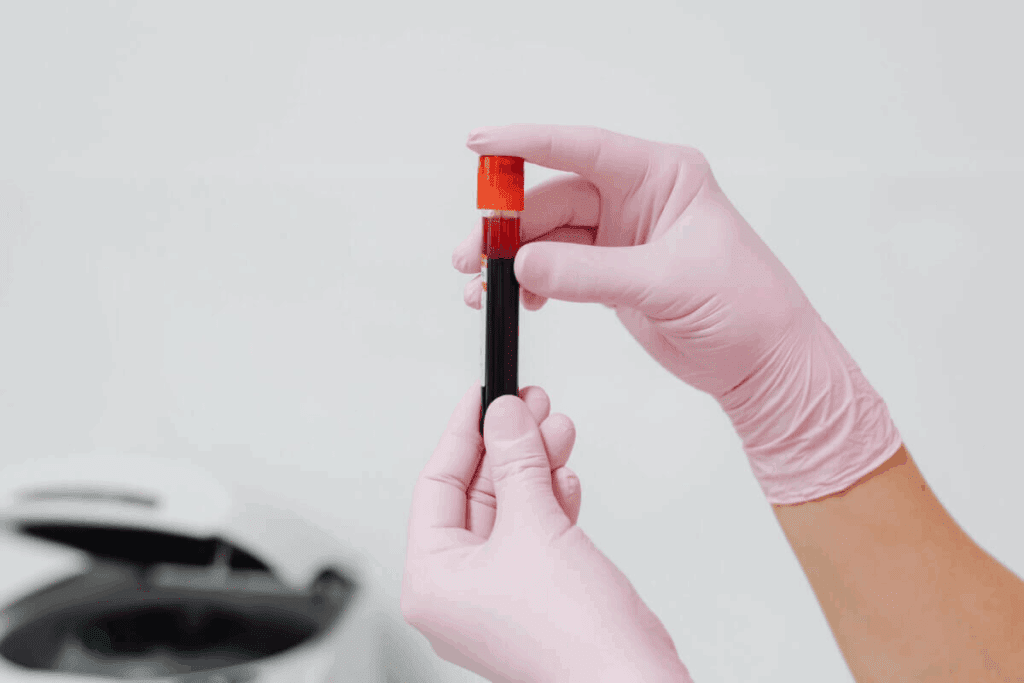Last Updated on November 20, 2025 by Ugurkan Demir

Anemia means you don’t have enough red blood cells or hemoglobin. This can make you feel fatigue and weakness. If you’re feeling this way, you should see the right doctor for help. Find out why do I need to see a hematologist for anemia. Get vital reasons why this specialist is crucial for low hemoglobin treatment.
A hematologist is a doctor who deals with blood problems, like anemia. They know a lot about blood, bone marrow, and lymphatic system issues. This makes them key in treating anemia.
Liv Hospital’s hematologists focus on you, making sure you get the right care for your anemia.

Anemia is when your body doesn’t have enough red blood cells. These cells carry oxygen to all parts of your body. Without enough, your body’s tissues don’t get enough oxygen, causing health problems.
Hemoglobin is key for carrying oxygen in red blood cells. It’s made of four protein chains and iron. This iron is vital for binding oxygen. When it does, it forms oxyhemoglobin and carries oxygen to your body’s tissues.
There are many types of anemia, each with its own cause and symptoms. Iron deficiency anemia is the most common. It can be caused by blood loss, not enough iron in your diet, or needing more iron. Other types include vitamin deficiency anemia and anemia of chronic disease.
Anemia symptoms can vary from mild to severe. You might feel fatigue, weakness, or shortness of breath. Severe cases can cause chest pain, dizziness, and confusion. Untreated anemia can lead to heart problems or poor pregnancy outcomes.
If you notice these symptoms, see a doctor right away. A hematologist can help diagnose and treat anemia. They specialize in blood disorders and can offer the best care for anemia.

Seeing a hematologist for anemia is key to getting better. Anemia is complex and can have many causes. A hematologist’s specialized care is needed for the right diagnosis and treatment.
Hematologists are doctors with deep knowledge in blood disorders, like anemia. They have 9 years of education, including 3 years of residency and up to 4 years of subspecialty training. This makes them experts in handling tough cases.
They can:
People often see a hematologist when standard treatments don’t work. This is when the cause is hard to find, symptoms keep coming back, or the anemia is very bad. A hematologist’s help is vital in finding the real cause and making a good treatment plan.
“The complexity of anemia requires a thorough approach, often needing a specialist.”
Seeing a hematologist for anemia has many benefits, mainly for serious cases. These benefits include:
| Benefit | Description |
| Accurate Diagnosis | They use advanced tests to find out exactly what kind of anemia you have. |
| Personalized Treatment | They create treatment plans that fit your needs perfectly. |
| Access to Advanced Therapies | Hematologists can use the latest treatments that general doctors can’t. |
By going to a hematologist for anemia, patients get the specialized care they need. This care greatly improves their chances of managing and recovering from anemia.
Iron deficiency anemia happens when the body doesn’t have enough iron. This is needed to make hemoglobin, a key protein in red blood cells. Hemoglobin carries oxygen to all parts of the body. This condition is very common and can cause serious health problems if not treated.
There are many reasons for iron deficiency. Not getting enough iron from food, losing blood too much, and needing more iron are some. For example, women of childbearing age lose a lot of iron during their periods. Pregnant women also need more iron for their baby.
In men and postmenopausal women, bleeding in the gut is a common reason. A study in the Journal of the American Medical Association found iron deficiency anemia is a big problem. It affects women and children in poor countries a lot.
To find out if someone has iron deficiency anemia, doctors use tests and check-ups. They look at serum ferritin levels, which show how much iron is in the body. Low levels mean you might not have enough iron.
If simple changes in diet and iron pills don’t help, or if you think there’s something else wrong, see a hematologist. Hematologists are experts in blood diseases. They can help with harder cases.
“For patients with iron deficiency anemia who do not respond to initial treatment or have complicating factors, referral to a hematologist is often the next step in management.”
In short, doctors can handle simple cases of iron deficiency anemia. But hematologists are key for more complex or serious cases. They make sure patients get the right care.
Knowing when to see a specialist for anemia is key to managing it well. Anemia is when you don’t have enough red blood cells or hemoglobin. It can be caused by iron deficiency, chronic diseases, or genetic disorders.
Primary care doctors are the first line in treating anemia. They start by doing a complete blood count (CBC) test. This test checks your red blood cell count and hemoglobin levels.
Based on the test results, they might start treatment for iron deficiency or other common anemia causes.
Initial steps may include:
While primary care doctors can handle many anemia cases, some signs mean you need a specialist. These include:
If you see these signs, a hematologist or anemia specialist is needed for more detailed diagnosis and treatment.
When a primary care doctor refers you to a specialist, they’ll review your medical history and test results. The specialist will do a detailed evaluation. This might include more blood tests, bone marrow examination, or genetic testing to find the cause of your anemia.
The table below shows the main differences between primary care and specialist care for anemia:
| Aspect of Care | Primary Care | Specialist Care |
| Initial Diagnosis | CBC test, initial assessment | Advanced blood tests, bone marrow examination |
| Treatment Approach | Iron supplementation, dietary changes | Complex treatments, including possible blood transfusions or specific medications for underlying causes |
| Condition Complexity | Manages common causes and mild cases | Addresses complex, rare, or severe cases |
Understanding the anemia treatment pathway helps patients get the right care for their condition.
Hematologists use advanced tools to find the cause of anemia. A complete blood count (CBC) is the first step. But, they have more tools to accurately diagnose and treat anemia.
Hematologists use specialized blood tests after the CBC. These include serum iron studies, vitamin B12 and folate levels, and reticulocyte count. These tests give important details about anemia’s cause.
Serum iron studies help find iron deficiency anemia. Vitamin B12 and folate levels are key for megaloblastic anemia. The reticulocyte count checks the bone marrow’s response.
In some cases, a bone marrow evaluation is needed. It examines the bone marrow for function and abnormalities. Genetic testing finds inherited anemia like sickle cell disease or thalassemia.
These methods help hematologists understand anemia’s causes. They can then create specific treatment plans.
Hematologists can spot rare and complex anemias with their skills and tools. They diagnose hemolytic anemia, aplastic anemia, and myelodysplastic syndromes.
Diagnosing these complex conditions is key for proper care. Hematologists’ advanced skills are vital in managing anemia and related disorders.
Anemia treatment plans vary based on the cause and how severe it is. Knowing the type of anemia is key to picking the right treatment.
Iron deficiency anemia often gets treated with iron supplements. The choice between oral and intravenous iron depends on several factors. These include how severe the deficiency is, how well the patient can tolerate it, and any health issues that might affect iron absorption.
Oral iron supplements are usually the first choice. They can be bought over-the-counter or prescribed. But, some people might have stomach problems or issues with iron absorption.
Intravenous iron therapy is an option for those who can’t take oral iron or haven’t seen enough improvement. It helps quickly add iron to the body.
| Treatment Aspect | Oral Iron | Intravenous Iron |
| Administration | Oral, daily doses | Intravenous infusion, typically in a clinical setting |
| Absorption | Dependent on gut health and other factors | Bypasses gastrointestinal absorption issues |
| Side Effects | Gastrointestinal upset, constipation | Rare but can include serious allergic reactions |
Anemia linked to chronic diseases, like kidney disease or rheumatoid arthritis, needs a detailed treatment plan. It’s important to manage the disease itself and treat the anemia too.
Erythropoiesis-stimulating agents (ESAs) help make more red blood cells in patients with certain chronic conditions. Iron supplements are often needed to support ESA therapy.
Hemolytic anemia, where red blood cells are destroyed too early, might need treatments to slow down this process. This could include immunosuppressive therapy or sometimes a splenectomy.
Aplastic anemia, where the bone marrow doesn’t make enough blood cells, might be treated with immunosuppressive drugs or bone marrow transplantation.
In severe cases of anemia, or when symptoms are bad, blood transfusions might be needed. They help quickly improve oxygen delivery to the body’s tissues.
Other treatments might include fixing nutritional deficiencies, better managing chronic diseases, or using drugs to help make more red blood cells.
Anemia is a complex condition that needs a team effort. Specialists beyond hematologists are key in tackling its causes and effects. Hematologists are vital in diagnosing and treating anemia, but others are also important.
Gastroenterologists are essential in finding and treating digestive problems that cause anemia. Issues like ulcers, colon cancer, or inflammatory bowel disease can lead to iron deficiency anemia due to chronic blood loss.
Gastrointestinal Causes of Anemia
| Cause | Description | Potential Consequences |
| Gastrointestinal bleeding | Bleeding from ulcers, varices, or tumors | Iron deficiency anemia |
| Malabsorption | Conditions like celiac disease or Crohn’s disease | Deficiencies in iron, vitamin B12, or folate |
| Gastric surgery | Previous gastric bypass or resection | Impaired nutrient absorption |
OB/GYNs are vital in handling anemia linked to pregnancy and menstrual issues. Pregnancy boosts iron needs, and not meeting these needs can cause anemia.
Menstrual disorders, such as heavy menstrual bleeding, can also cause iron loss and anemia. OB/GYNs are skilled in diagnosing and treating these conditions.
Oncologists often deal with anemia in cancer patients. Anemia can stem from the disease itself or from treatments like chemotherapy.
Types of Anemia in Cancer Patients
Nephrologists manage anemia linked to chronic kidney disease (CKD). The kidneys produce erythropoietin, a hormone that helps make red blood cells. CKD can lead to a lack of this hormone, causing anemia.
The connection between kidney function and anemia shows the need for a team approach in patient care. Specialists like nephrologists, gastroenterologists, OB/GYNs, and oncologists work together to care for anemia patients comprehensively.
To get the most out of your hematology appointment, being well-prepared is key. This preparation helps you make the most of your visit. It also ensures your hematologist has all the details needed to care for you best.
When you visit a hematologist, bringing all relevant medical records is important. This includes:
Organizing your records before your appointment can save time. It helps your hematologist understand your condition better. Consider making a folder or digital file with all your relevant documents.
Coming prepared with a list of questions can help you understand your diagnosis and treatment options better. Some questions to consider asking include:
For more information on how a hematologist treats anemia, you can visit this resource.
During your initial appointment, your hematologist will likely conduct a thorough examination. They will review your medical history and may order additional tests. Knowing what to expect can help reduce anxiety and make the process smoother.
| Appointment Stage | What to Expect |
| Initial Consultation | Discussion of your medical history and symptoms |
| Physical Examination | A thorough physical check-up |
| Diagnostic Tests | Blood tests, bone marrow biopsy, or other tests as necessary |
| Follow-up Care | Scheduling follow-up appointments to monitor your condition and adjust treatment as needed |
By being prepared and understanding what to expect, you can take an active role in managing your anemia. This can improve your overall health.
Understanding anemia and working with a hematologist is key to managing it well. By being active in your treatment, you can greatly improve your life quality.
Your doctor will guide you through the diagnosis and treatment of anemia. With their help, you can make smart choices about your care. This leads to a treatment plan that fits you best.
Being proactive in your health is important. Ask questions, get a second opinion if needed, and follow your treatment plan. This way, you can get better and take back control of your life.
Managing anemia well is a team effort. You and your healthcare team working together can beat the challenges of anemia. This improves your overall health and well-being.
For anemia, see a hematologist. They specialize in blood disorders. Hematologists can handle complex or severe cases.
Primary care doctors can handle mild anemia. But for severe cases, a hematologist is needed. They have the training for advanced care.
See a hematologist for severe or persistent iron deficiency anemia. They offer advanced tests and treatments.
A primary care doctor can start treating iron deficiency anemia. But for complex cases, a hematologist or gastroenterologist might be needed.
Yes, hematologists can treat many types of anemia. This includes iron deficiency, hemolytic, aplastic, and more. They also handle anemia related to chronic diseases or cancer.
Prepare by gathering your medical records and writing down your symptoms. This helps the hematologist understand your situation better.
Expect a review of your medical history and a physical exam. The hematologist may order tests to diagnose your anemia. Follow-up care will depend on your diagnosis and treatment plan.
You might see other specialists depending on your anemia’s cause. For example, a gastroenterologist for gastrointestinal bleeding or an OB/GYN for pregnancy-related anemia. Oncologists might be involved if anemia is cancer-related.
Hematologists use advanced tools like specialized blood tests and genetic testing. These help diagnose rare and complex anemias.
Treatment varies by anemia type. Hematologists might prescribe iron supplements or manage chronic disease-related anemia. They also treat complex anemias with specific therapies.
Subscribe to our e-newsletter to stay informed about the latest innovations in the world of health and exclusive offers!